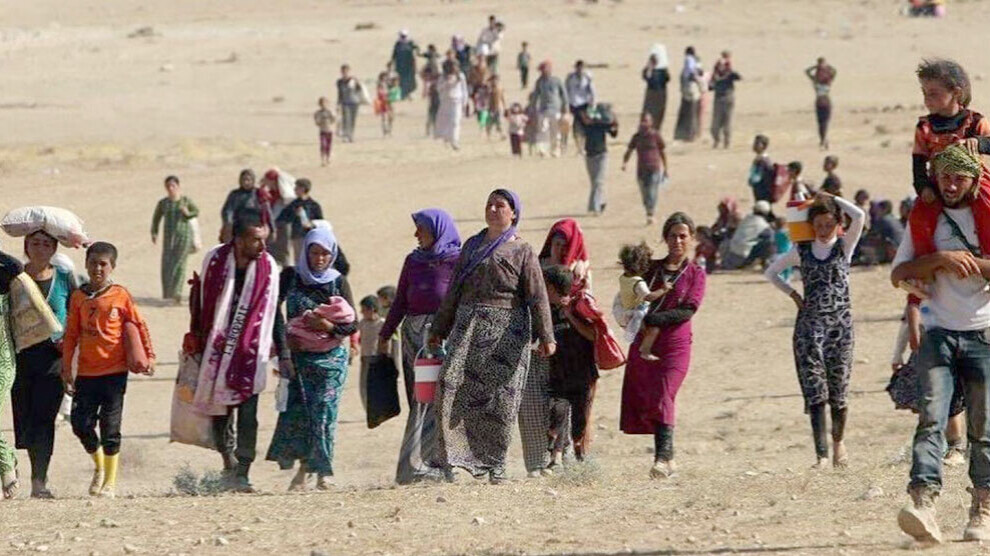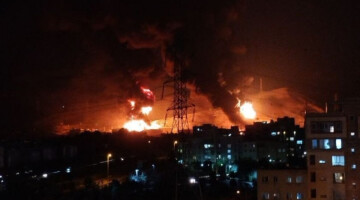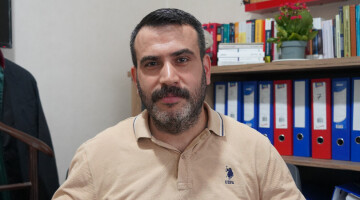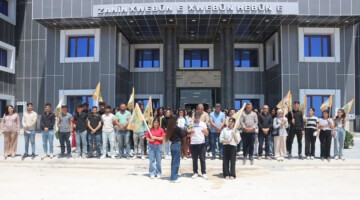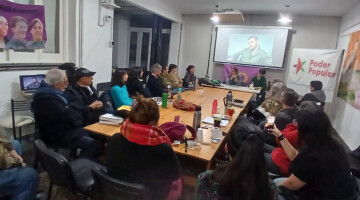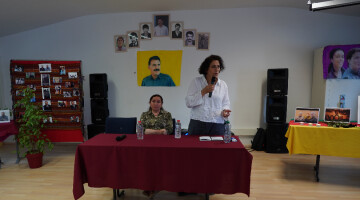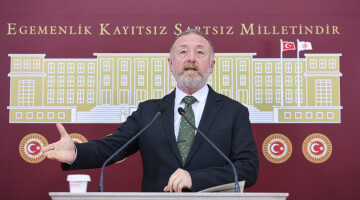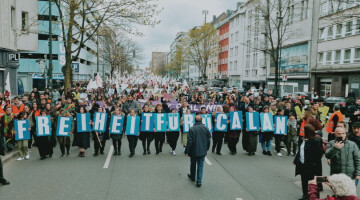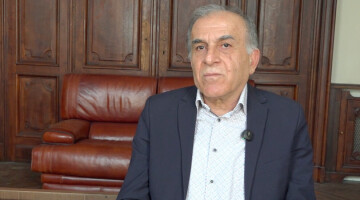The Ezidi (also: Yezidi, Yazidi) community is one of the oldest communities of humanity. Drawing on this history, it possesses a strong culture of life. In its culture and belief, it kept up many traces of a natural society down to the present day. Most Ezidi customs have been shaped within nature. Respect for all living beings is fundamental to the Ezidi culture and belief. Close relations between humans as well as between human life and all living beings have not been cut off from its free and natural essence. The culture created is a collection of values comprising thousands of years. Until today, the Ezidi community earns its living mainly from agriculture and physical work. The mythology that is still alive within society shows that the woman is a main element in the life of the Ezidis. With her own will and original color, she perpetuates her culture and belief. The Ezidi philosophy of life is based upon equality and mutual appreciation. Without making any difference, the community protects their children; children are seen as the future and continuity of Ezidi existence and therefore, in priority to everything else, are educated aligned with the values of their belief in Ezda. (“Ezda” is one of several names by which the Ezidis call God. It is rooted in the words “ez dayîm” – “[the one who] has given/created me” – which also the word “Ezidi” is based upon.)
Throughout history, the Ezidi community has been confronted with hundreds of massacres and genocidal acts carried out against them. The biggest and most brutal ones of them, counted 74 in number, are discussed a lot and have branded the Ezidis’ collective memory forever. The world knows the Ezidi people rather because of genocides than by their culture and belief – a painful reality for the Ezidis. The 74th genocidal act was carried out in the year 2014 by Daesh, the so- called Islamic State group. Without doubt this genocide caused lots of pain, trauma and deep losses within the Ezidi community. Tens of thousands of Ezidi were murdered, abducted and taken as slaves. Children were forcibly recruited as child soldiers. On top of that, hundreds of thousands of inhabitants of Shengal were expelled from their homeland. Until today, about 200.000 of them live under miserable conditions in camps in the Kurdistan Region of Iraq.

All Ezidi values were attacked. In Ezidi holy places, 6 temples were blown up and tens of buildings were detonated. The whereabouts of thousands of Ezidis couldn’t be clarified until now. At least 87 mass graves have been found throughout the Shengal region so far, with most of them still due to be exhumed for taking DNA samples and making proper burials possible. Many places have not yet been cleared of mines and IEDs (Improvised Explosive Devices) left behind by Daesh. All too often, these mines lead to deaths among the local population.
The crimes that Daesh committed against the Ezidi community constitute a genocide by international human rights (see Genocide Convention of 9 December 1948, Art. 2). Several political entities of the international community of states, including the US House of Representatives and Department of State, the European Parliament and the French parliament, have already formally recognized them as such. The punishment of the perpetrators, although required by §§ 3, 4 of the Genocide Convention, has only shown slow progress so far. Only a small percentage of the persons responsible for the genocide have been sued and convicted. This lack of justice additionally reinforces the trauma and ongoing grief that the Ezidis are still undergoing.
Suffering of women in the frame of the 2014 genocide
In all massacres and genocides, women were the ones suffering most. Assimilating and murdering women are frequently adopted as means to wipe out the identity, culture and belief of a society. The genocide of 3 August 2014 is one example of this. When women fell into the hands of Daesh, they would usually be raped, sold as slaves and/or forced into marriage with jihadist fighters. Not only were they themselves violently pressured to follow the rules of radical Islam, their children were also indoctrinated with Daesh ideology. Women who resisted against the jihadists’ orders faced cruel punishments, sometimes leading to their death. Tens of women also committed suicide by slitting their wrists or throwing themselves from rocks in order to escape or prevent a life under Daesh oppression.

After the 74th genocide, women and children were again the ones most heavily affected by the ongoing difficult situation. The forced migration had an especially strong negative impact on women, since the majority of them have a strong connection to their own place and land. Through the loss of almost all possessions, poverty evolved. The major part of this burden is lifted by women because of their direct responsibility for their children and families. For years, women have tried to manage their everyday life under great difficulties in tents. Because of the destruction and lack of infrastructure in all the villages and cities of the Shengal region, they are faced with lots of health and society problems. Basic necessities like drinking water, electricity and utilities for childcare can barely and only under huge efforts be fulfilled. Most women struggle with mental health issues. Female migrants in other countries and especially in the camps in the Kurdistan Region of Iraq are pressured into behavior and actions far from their own moral, culture and belief.
The role of Iraqi state players after the genocide
In August 2014, together with the security forces, the political administration of Shengal withdrew from the region. Since then, attempts to impose a proper administration have failed and, if they happened, rather constituted a formality than created an institution actually capable of acting. State services and reconstruction work remain very poor. Many Ezidis consider the troop withdrawal a betrayal and therefore lost most of their trust in the state, especially in matters concerning security and protection.
After years of disputes around responsibility and power over Shengal, the federal Government of Iraq and the KRG (Kurdistan Regional Government) reached an agreement on 9 October 2020: the so-called Shengal agreement, mediated under assistance of the UNAMI (United Nations Assistance Mission for Iraq). Most parts of Shengal’s people themselves have voiced disapproval and protested against the agreement though, criticising that they had not been consulted and that the result didn’t meet their needs.
Main security threat after the genocide: Turkish airstrikes
Since Shengal’s liberation from Daesh, the most critical security issue has been imposed by airstrikes performed by the Turkish Air Force since 2017 (see also: chronology attached to this dossier). While the Turkish State claims to target members of the PKK (Kurdistan Workers’ Party), the vast majority of victims comprises Shengal’s local Yezidi population, including a large number of civilians. Examples of especially painful happenings are the bombardment of Sikeniye hospital on 17 August 2021 that killed 8 patients and health workers, and the drone strikes that hit Sinune People’s Council as well as a nearby stationery shop on 15 June 2022, leading to the deaths of 12-year-old Salah Nassir as well as political activist Ibrahim Derwish Abdi. Through these happenings, the Turkish State furthermore committed violations of the Geneva Convention on International Humanitarian Law (see Geneva Convention IV, Art. 18: Protection of hospitals) and war crimes according to the Rome Statute of the International Criminal court (see Art. 8 §2 (b) i, ii, iv), though the latter has not been signed by Turkey yet.
Ezidi Women’s Freedom Movement (TAJÊ)
In order to prevent further massacres and as a response to the genocide of 3 August 2014, Ezidi women have organized themselves. At the beginning, in 2015, they acted as a women’s group and started work to strengthen and educate women and to support them to form their own will. After more women had come together, they widened their organization. In 2016, the Ezidi Women’s Freedom Movement (TAJÊ) was founded in a congress. TAJÊ works on the basis of the thoughts and philosophy of Abdullah Öcalan and his paradigm of Democratic Confederalism and women’s freedom. It perceives equality of both genders, democracy among all different peoples and the protection of nature as fundamental.

TAJÊ gives the highest priority to the liberation of Ezidi women that have been enslaved by Daesh. In cooperation with the SDF (Syrian Democratic Forces), the Ministry of Women of NES (North and East Syria), the Mala Ezidiyan (“House of the Ezidis”) in NES and the Ezidi Women Support League in Shengal, around 1500 Ezidi women have so far been liberated from the hands of DAÎŞ jihadists and reunited with their families.
Furthermore, TAJÊ fights against sexist approaches. It confronts the violence directed against women within families, society and at work that views women without their own identity, thoughts and will. Thereby TAJÊ builds up relations with women’s organizations of other ethnicities and religions, including Kurds, Arabs, Assyrians, and Chaldean Catholics. For practical work, TAJÊ organizes itself in committees, for example, for education, economy, culture and arts, and health.
Annex: Selection of Turkish airstrikes on Shengal 2017 – June 2022
2017: On 24 March, bombings took place in Amud, Qaeya Kerse and Geliye Kerse. In Qaeya Kerse, YBŞ fighter Gencho Siba Shekh Khidir was killed.
2018: On 15 August, a drone strike on Geliye Shilo took place. The pioneer of the Ezidi society, “Mam” (“Uncle”) Zeki Shingali (Ismail Ozden) and his driver, Mahir Guney, were killed.
2019: This year, bombings took place 3 times.
On 19 November, a drone strike on Khanasor took place. On 20 November, YBŞ fighter Eziz Salih succumbed to his injuries.
On 13 December, 3 workers from North and East Syria (Western Kurdistan) were killed.
2020: This year, bombings took place 4 times.
On 15 January, YBŞ commander Nezar Bapir, his brother Eymen Bapir and two YBŞ fighters – Eli Hisen Khidir and Hemid Khalil Qasim – were killed.
On 14 June, 2 YBŞ fighters were injured in attacks carried out by warplanes.
On 9 November, a YBŞ fighter is killed in a drone strike.
2021: This year, bombings took place 7 times. In total, 11 people lost their lives.
On 16 August, YBŞ commander Said Hesen and his nephew, YBŞ fighter Isa Khudeda, were killed in a drone strike in Shengal city.
On 17 August, warplanes bombed Sikeniye hospital. 8 people died, 3 of whom were hospital staff.
On 7 December, the male co-chair of the Executive Commission of the Democratic Autonomous Council of Shengal, Merwan Bedel, was killed in a drone strike on his car. At the time of the attack, 2 of his children were with him; they were injured.
On 11 December, war planes bombed the People’s Council of Khanasor. Parts of the building are destroyed and further material damage caused.
2022: On 21 January, YBŞ commander Suleyman Shemo Yusuf and YBŞ fighter Nachi Hachi Sebro are killed in a drone strike.
On the night from 1 to 2 February, 21 places in the Shengal region were bombed. 3 civilian Arab workers were killed, another one injured.
On 15 June, the People’s Council of Sinune and a nearby stationery shop were bombed. Twelve-year-old Seleh Nasir is killed. An Ezidi named Ibrahim Derwesh Abdi gets injured and, eight days later, in hospital, succumbed to his injuries. Another 7 civilians got injured in the attacks, too.

